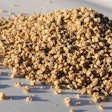In a recent study from New Zealand, five diets containing 60 percent finely ground corn (hammer milled) or 15, 30, 45 and 60 percent coarsely cracked corn (roller milled) replacing finely ground corn, weight for weight, were tested in broilers from 11 to 35 days post-hatch. Weight gain increased with increasing inclusion levels of coarse corn. Feed intake increased at 15 percent of coarse corn inclusion, plateaued until 45 percent, and then increased again at 60 percent.
Feed per gain increased as inclusion of coarse corn increased to 30 percent and then decreased with further inclusion. Apparent metabolizable energy and total tract dry matter retention was unaffected up to 30 percent inclusion and then decreased with further inclusion of coarse corn. Inclusion of coarse corn had no effect on ileal digestibility of dry matter, nitrogen and starch.
Breast meat yield decreased and abdominal fat increased with increasing inclusion levels of coarse corn, but there was no effect on carcass yield. Lactobacillus spp. and Bifidobacteria spp. cecal counts increased and counts of Clostridium spp., Campylobacterium spp. and Bacteroides spp. decreased with increasing inclusion levels of coarse corn.
It was concluded that feeding coarse corn increases weight gain, modifies gut microflora profile toward beneficial species and can completely replace ground corn in broilers fed mash diets.




